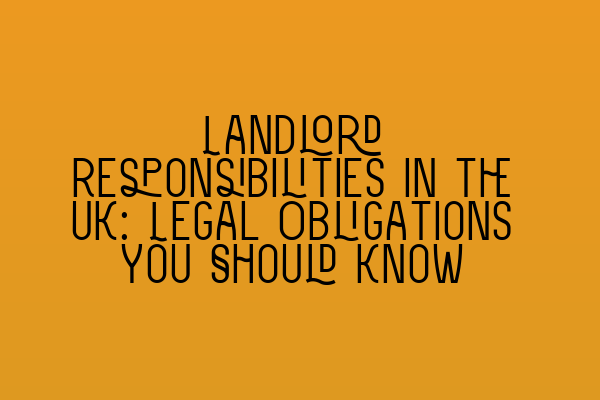Landlord Responsibilities in the UK: Legal Obligations You Should Know
As a property owner or landlord in the UK, it is important to understand your legal responsibilities and obligations towards your tenants. Failing to meet these obligations could not only result in financial penalties but also damage your reputation as a landlord. In this article, we will outline the key landlord responsibilities you need to know to ensure a smooth and compliant tenancy.
1. Providing a Safe and Habitable Property
First and foremost, landlords have a duty to provide a safe and habitable living environment for their tenants. This includes regular maintenance of the property, ensuring that all essential services are in working order, and addressing any repair issues promptly. Failure to meet these responsibilities can result in legal action or compensation claims from tenants.
It is also important to comply with the relevant health and safety regulations, such as ensuring that the property has adequate fire safety measures, including smoke alarms and fire extinguishers. Regular gas and electrical safety checks are also mandatory, and documentation must be provided to tenants.
For further guidance on property maintenance and safety, it is advisable to consult with a qualified property lawyer who can assist you in understanding your legal obligations.
2. Protecting Tenants’ Deposits
Under the Tenancy Deposit Protection (TDP) scheme, landlords are required to protect their tenants’ deposits in a government-approved deposit protection scheme. This ensures that the deposit is safeguarded and can be returned to the tenant at the end of the tenancy, provided there are no outstanding rent arrears or damages beyond fair wear and tear.
It is crucial to provide tenants with the prescribed information about the deposit protection scheme within 30 days of receiving the deposit. Failure to do so can result in financial penalties and prevent landlords from serving a Section 21 Notice to regain possession of the property.
To ensure compliance with the TDP scheme, it is advisable to seek legal advice from a property lawyer who can guide you through the process.
3. Respecting Tenancy Agreements and Rent Increases
A tenancy agreement outlines the terms and conditions of the tenancy, including the rent amount, payment schedule, and duration of the tenancy. As a landlord, it is essential to adhere to the terms of the agreement throughout the tenancy.
If you wish to increase the rent during the tenancy, you must provide at least one month’s notice (for monthly rent) or the length of the rental period as specified in the tenancy agreement. Rent increases must be reasonable and not exceed market rates for similar properties in the area.
Any changes to the tenancy agreement should be agreed upon by both parties and documented in writing. It is advisable to seek legal advice before making any modifications to the original agreement.
4. Dealing with Repairs and Maintenance
Landlords are responsible for repairing and maintaining the structure and exterior of the property, as well as ensuring that essential services (such as plumbing, heating, and electricity) are in working order.
Tenants have a right to live in a property that is safe and in good repair. Therefore, landlords must address any repair requests promptly and carry out necessary maintenance to keep the property in a habitable condition. Failure to do so can lead to legal action from tenants or even intervention from local housing authorities.
It is important to keep a record of all repairs and maintenance performed on the property, including receipts and invoices.
5. Providing Proper Notice for Inspections or Entry
As a landlord, you have the right to inspect the property periodically to ensure that it is being maintained and used in accordance with the tenancy agreement. However, you must provide proper notice to tenants before entering the property.
The standard notice period for inspections is at least 24 hours. It is important to respect your tenants’ privacy and only enter the property during reasonable hours, unless there is an emergency situation.
Conclusion
Being a responsible landlord in the UK involves fulfilling various legal obligations and responsibilities towards your tenants. From providing a safe and habitable property to protecting tenants’ deposits and respecting tenancy agreements, it is crucial to stay informed and compliant with the law.
If you have any questions or concerns about your landlord responsibilities, it is always advisable to seek professional legal advice. The expert property law solicitors at SQE Property Law & Land Law can provide you with the guidance and assistance you need to ensure a smooth and legally compliant tenancy.
Related articles:
